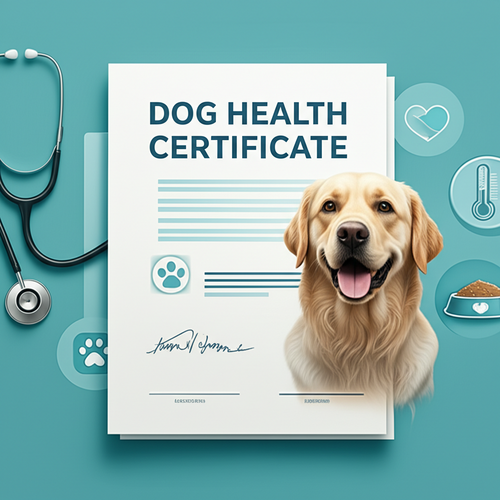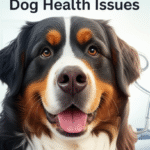What is a Dog Health Certificate?
A dog health certificate is an essential official document issued by a licensed veterinarian that serves as a verified record of your dog’s health status. This crucial certificate typically includes comprehensive details such as your dog’s up-to-date vaccination records, the results of a general health check-up, vital information regarding any contagious diseases, and definitive confirmation that your dog is fit for various purposes, including travel or participation in events. From a pet care perspective, obtaining a dog health certificate empowers owners to be proactive about their dog’s overall wellness, ensuring all necessary vaccinations and preventive treatments are current and properly documented.
The significance of this document extends beyond individual pet health; legally, many regions and institutions mandate this certificate when transporting dogs or bringing them into specific public or private facilities. This requirement is primarily in place to prevent the spread of diseases and to safeguard public health and the health of other animals. For example, airlines frequently require a health certificate issued within a very short window before travel, and many local governments necessitate one for licensing purposes. Understanding the vital role of a dog health certificate is fundamental for responsible pet ownership, underscoring the importance of regular veterinary visits and adherence to all legal health requirements. For more tips on daily dog care and overall well-being, explore our comprehensive guide on Best Dog Care Tips: How to Care for a Dog Daily.
When is a Dog Health Certificate Needed?
Dog health certificates are frequently required in a variety of situations to ensure the well-being of your pet and to protect public and animal health. Understanding these common scenarios helps pet owners prepare adequately and avoid last-minute complications:
1. **Travel and Transport**: One of the most common reasons to obtain a health certificate is for travel. Many countries, states, and airlines have strict regulations requiring a valid health certificate before a dog can enter or board. This certificate ensures your dog is free from contagious diseases and is fit to travel, typically verifying recent vaccinations, parasite control, and overall health status.
2. **Adoption and Sale**: When a dog is adopted or sold, a health certificate provides crucial assurance to the new owner about the pet’s health. It confirms that the dog has been thoroughly examined by a licensed veterinarian and is free from known diseases, fostering trust and transparency in the transaction.
3. **Veterinary Visits**: While not always required for routine check-ups, in certain cases, particularly for specialized treatments, major surgeries, or when transferring care to a new clinic, a health certificate or a detailed health summary may be requested. This helps to document the dog’s current health condition and provides a comprehensive medical history to guide future care.
4. **Dog Shows and Competitions**: Participants in dog shows, agility trials, or other competitive events are often required to provide a health certificate. This is to prove that their dog meets specific health standards and does not pose a health risk to other animals participating in the event.
5. **Boarding and Daycare Facilities**: To ensure the safety and health of all animals under their care, many reputable boarding kennels, pet daycare centers, and even some groomers ask for a recent health certificate. This helps to prevent the spread of illnesses within the facility.
In each of these scenarios, obtaining a health certificate typically involves a thorough veterinary examination and may require proof of up-to-date vaccinations, appropriate parasite treatments, and overall physical fitness. For further guidance about caring for dogs in various situations, you can explore informative resources such as our comprehensive article on Best Dog Care Tips: How to Care for a Dog Daily.
How to Obtain a Dog Health Certificate
Obtaining a dog health certificate involves a systematic process centered around a thorough veterinary examination and meticulous documentation. To ensure your certificate accurately reflects your dog’s condition and complies with all necessary requirements, follow these detailed steps:
1. **Schedule a Veterinary Appointment**: The first and most crucial step is to contact a licensed veterinarian to arrange a comprehensive health check-up for your dog. It is vital that the chosen vet is authorized to issue health certificates, especially for specific purposes like interstate or international travel, as requirements can vary.
2. **Prepare Your Dog’s Medical History**: Before the appointment, gather all relevant past medical records, a complete history of your dog’s vaccinations, and any previous health certificates. Providing this comprehensive background to the veterinarian will significantly aid them in evaluating your dog’s current health status effectively and identifying any ongoing or past health concerns.
3. **Veterinary Health Examination**: During the scheduled visit, the vet will conduct a thorough physical examination of your dog. This includes assessing their overall physical condition, checking their temperature, heart rate, and respiratory health, and examining their skin, eyes, ears, and dental health. The veterinarian will also meticulously check for any signs of infectious diseases, parasites, or other underlying health issues.
4. **Vaccinations and Treatments**: It is imperative to ensure your dog is current on all required vaccinations, particularly the rabies vaccine, which is almost universally mandatory for health certificates. The vet may administer any overdue vaccines or necessary preventive treatments (such as flea, tick, or heartworm prevention) during this visit to meet the certificate’s requirements.
5. **Diagnostic Tests**: Depending on the specific purpose of the certificate (e.g., travel to certain regions, sale, or breeding), the vet might require additional diagnostic tests. These could include blood tests, fecal exams, or other screenings to definitively certify that the dog is free from specific communicable diseases or parasites.
6. **Issuance of the Health Certificate**: Once the veterinarian confirms that your dog’s health status meets all the required standards for the certificate’s purpose, they will complete and sign the official document. This certificate typically includes essential details such as dog identification (breed, age, microchip number), owner information, the date of the examination, vaccinations administered, and the vet’s official certification statement.
7. **Collect and Store Documentation**: Upon receiving the original certificate, keep it in a safe place. It is advisable to make several copies for travel, boarding, or other official purposes. Be aware that some countries or institutions may require this certificate to be issued within a very specific, narrow time frame (e.g., 10 days) before travel or an event, so planning is essential.
Following these comprehensive steps meticulously guarantees that your dog’s health certificate accurately reflects their healthy condition and fully complies with all legal or travel requirements. For more detailed insights on maintaining and ensuring your dog’s overall health, explore our comprehensive care guides, such as Best Dog Care Tips: How to Care for a Dog Daily or How to Groom Your Dog at Home. For further information on pet health certifications or a wide range of other dog care topics, you can always visit DogsCare.life.
What Health Checks and Vaccinations are Included?
A standard dog health certificate is designed to confirm your dog’s overall well-being and to prevent the transmission of contagious diseases. To achieve this, it encompasses a series of essential health checks and vaccinations. These typically include:
1. **Physical Examination**: A thorough physical assessment by a licensed veterinarian forms the cornerstone of the health certificate. This comprehensive check evaluates the dog’s overall body condition, eyes, ears, nose, mouth, teeth, skin, coat, heart, lungs, and abdomen. The vet also examines the limbs and gait, looking for any abnormalities or signs of health issues that could impact the dog’s fitness.
2. **Vaccinations**: Up-to-date vaccinations are a critical component, verifying that your dog is protected against prevalent diseases.
* **Rabies Vaccine**: This is mandatory in most regions and countries due to the fatal nature of the rabies virus and its zoonotic potential (ability to spread to humans).
* **Core Vaccines**: These are universally recommended for all dogs and typically include Distemper, Parvovirus, Adenovirus (Canine Hepatitis), and Parainfluenza. These vaccines protect against highly contagious and often severe diseases.
* **Non-Core Vaccines**: Depending on your dog’s lifestyle, geographical location, and risk factors, additional non-core vaccines may be included. Common examples are vaccines for Bordetella bronchiseptica (a primary cause of kennel cough), Lyme disease (for dogs in tick-prone areas), and Leptospirosis (for dogs exposed to contaminated water or wildlife). According to the American Veterinary Medical Association (AVMA), core vaccines are considered essential, while non-core vaccines are administered based on individual risk assessment.
3. **Parasite Control**: The certificate often includes details on parasite status and prevention.
* A fecal examination for intestinal parasites helps detect common worms that can affect a dog’s health and be transmissible.
* A heartworm test is particularly crucial in areas where heartworm disease is prevalent, confirming the dog is free of this potentially fatal condition.
* Recommendations for ongoing preventative treatments for fleas, ticks, and worms are also typically provided and sometimes required.
4. **Weight and Nutrition Assessment**: The veterinarian will assess your dog’s current weight and body condition score, providing insights into their nutritional status. This helps identify issues like obesity or nutritional deficiencies, which can impact overall health and travel fitness.
5. **Microchip Information**: For identification purposes, especially for international travel, confirmation that the dog is microchipped is often included. The microchip number is recorded on the certificate to link the document definitively to your specific pet.
These detailed health checks and vaccinations provide peace of mind to dog owners, confirming that their beloved companion is healthy and safe for travel, adoption, or entry into various boarding facilities. For more detailed daily care tips that contribute to your dog’s overall health, see our comprehensive guide on Best Dog Care Tips: How to Care for a Dog Daily.
Maintaining and Updating Your Dog’s Health Certificate
Keeping your dog’s health certificate valid and up-to-date is crucial for ensuring their continued well-being and for complying with various requirements, especially for travel or participation in events. This ongoing process requires consistent care and meticulous documentation.
Firstly, it is essential to ensure your dog receives regular veterinary check-ups. These routine visits are not only vital for monitoring your dog’s overall health but also for maintaining their vaccination schedule, ensuring appropriate parasite control, and conducting routine health screenings. Such visits are often a prerequisite for renewing or updating a health certificate, which typically must be issued or endorsed by a licensed veterinarian within a specific timeframe.
Secondly, maintaining detailed records of all medical treatments, vaccinations, and preventive care is paramount. These comprehensive documents may be requested as supporting evidence for certificate renewal or during travel inspections. Keeping a well-organized file, either physical or digital, of your dog’s medical history will streamline the renewal process significantly.
Thirdly, always be acutely aware of the health certificate’s expiration date. Health certificates commonly have limited validity periods, particularly for specific purposes. For instance, international travel certificates often have a very short validity, sometimes as little as 10 days from the date of issuance or endorsement. Therefore, planning your vet visits well in advance of any travel or event deadlines is absolutely crucial to avoid last-minute complications or denied entry.
Additionally, consistent attention to your dog’s overall health is key. Providing a balanced, nutritious diet, ensuring regular exercise tailored to their needs, and consistently administering preventive care are fundamental to avoiding illnesses or conditions that could invalidate their health certificate. For international travel, it’s imperative to confirm specific health certificate requirements based on the destination country’s regulations, as these can vary widely and change frequently. Checking with the relevant embassy or consulate well in advance can prevent unforeseen issues.
For a comprehensive guide on everyday health care for your dog, including detailed nutrition and grooming tips that contribute to their long-term health, visit our detailed article on Best Dog Care Tips: How to Care for a Dog Daily. Regular updates to your dog’s health certificate and consistent vet visits not only ensure compliance with regulations but also actively contribute to your beloved pet staying healthy and happy wherever your journey together may lead.


